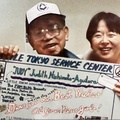Serve the shogun with single-minded devotion.
—Aizu samurai code of conduct
Kintaro Ikeda was alone in this world, but that was not always the case. In Aizu-Wakamatsu, he had brothers, his parents, grandparents, and many aunts and uncles. And then the Boshin War came.
Practically all were dead now or rotting in the hinderlands of Aomori, the northern part of Honshu. John Henry Schnell, the Prussian who had provided the warriors of Aizu-Wakamatsu with rifles and guns, had been arrested by the Meiji imperial army but was eventually released because he was a gaijin, a foreigner. When Schnell announced that he, his wife, and newborn child were going off to the land that had been once off-limits, America, to create a new colony, Kintaro agreed to join in. What else did he have to lose?
On the boat Kintaro brought with him one knapsack, which held a coat and some personal items, including a small bag with a drawstring.
At times the voyage was choppy and he found himself on deck, getting ready to vomit into the sea if necessary.
“Kintaro—” someone called out from the middle of the ship. It was Schnell. “Are you seasick? Sit here.” Schnell gestured to a spot next to him. “It’s more steady here.”
Kintaro felt the sea spray on his face, refreshing him.
“We need to prove the naysayers wrong,” Schnell told Kintaro. “No one thinks that we can make it in America.”
Kintaro knew Schnell was an optimist. He was the one who had taught Kintaro and his siblings to shoot guns and rifles. Yet that didn’t stop the imperial soldiers from bringing their powerful cannons, their explosives ripping through the thick walls of the Tsugaru Castle. One of these cannon bombs, in fact, fell a few feet from Kintaro, causing him to black out for some time. When he awoke, all the people around him, including his father, were gone.
Who thought that old men, women, peasants, and worn-out samurai could beat Meiji forces with their advanced weapons? The people of Aizu-Wakamatsu had been fooling themselves and Schnell himself talked a good game.
After feeling better, Kintaro went down below deck, only to see a man searching through his bag. The man had a slash through his face that just missed his right eye.
“What are you doing going through my things?” Kintaro yelled out.
“Why are you carrying dirt and rocks?”
“That’s my business.”
As the ship lurched back and forth at night, Kintaro slept fitfully. Reaching out for his knapsack, he rubbed the contents in his drawstring bag.
“Kintaro, Kintaro—” A figure appeared before him.
“My younger brother!” Kintaro called out. He then noticed the knife wound in his brother’s stomach. “Why did you take your life?”
“We saw the smoke coming from Tsugaru Castle. We knew that we had failed in our mission to keep the imperial forces from descending on you.”
Three other people appeared behind his brother—their mother and grandparents, their clothing burnt and ravaged.
“I searched for you, but there were too many dead bodies.” Tears dripped down Kintaro’s face.
“We were trying to detonate the explosives with blankets to no avail.”
Kintaro’s family members embraced each other, forming a tight ball. Kintaro threw his arms over them in an attempt to both comfort them and feel their warmth.
The next morning Kintaro’s body was wet with sweat on the floor of the bottom deck. “Where is my family? I spoke to them last night,” he asked the man with the scar.
“You were yelling all throughout the night. I tried to shut you up.”
Once they eventually arrived to the site where they were to establish their colony, Kintaro’s companion could not contain his disappointment. “I don’t have a good feeling about this place. Do you see how dry it is? How can our plants thrive in this place?”
Kintaro surveyed the land and noticed a valley where the land dipped down and a source of water was evident. He emptied the contents of his bag into the mix of shells, ground limestone, and ashes. Using his bare hands, he stirred his homemade cement and with other men created a manmade lake in this indention of land.
Once the lake was complete, Kintaro released two koi into the water. They whipped through the shallow part, creating ripples throughout the surface.
The orange koi jumped out onto the shore. “Kintaro, you must go,” it said to him.
Kintaro blinked, incredulous that the koi should be talking to him.
“There is no future here at Wakamatsu Colony. Your leader will abandon you.”
“No, no, he will not!” Kintaro declared. He felt the anger rise to his head. All that was lost in Aizu-Wakamatsu. The same could not happen here. He tore at his shirt and cried out again. The sky turned totally black.
When he opened his eyes, he found himself on his bed in a house that he shared with the other young bachelors. The doctor offered some kind of concoctions of herbs. “Drink, this will make you feel better.”
His head began to feel woozy and Kintaro closed his eyes. He heard one of his roommates, Makoto, who had a scar on his face, talking to the doctor.
“He’s been having these hallucinations ever since we left Japan.”
“It’s trauma from the war. It looks like he sustained an injury to his head.”
“People are saying that he’s a prophet. That he can predict the future.”
“That’s nonsense,” the doctor replied. “I would keep my eye on him to make sure he doesn’t get too erratic.”
The next morning, right as the sun was rising, Kintaro got up to visit with the koi. He had lined the lake bed with soil and ashes from Aizu-Wakamatsu. He expected his family members to appear again like they had in the boat.
Step by step he entered the lake, until the cool water was up to his neck. He felt something bumping into his back. It was the koi that was pure white.
“Go back to the shore, Kintaro,” it said.
“Why? I want to go into the other world like my family.”
“It’s not your time yet. The colony needs you.”
“But why? It’s doomed anyway.”
“Not all will die. Some will mate with the people of this country.”
Kintaro was shocked. Could that really happen?”
“For their sake, Kintaro, you must stay. And you must speak of hope, not darkness.”
Kintaro floated on his back for a while, watching the sun rise from the east, making the hills look even more golden.
He was given a new mission in this country. And he was determined to fulfill it.
(Author’s Note: The nonfiction sources used for this fictional creation included Daniel A. Métraux’s The Wakamatsu Tea and Silk Colony Farm and the Creation of Japanese America, Discover Nikkei articles, and Gary Noy’s Sierra Stories: Tales of Dreamers, Schemers, Bigots, and Rogues.)
© 2020 Naomi Hirahara





